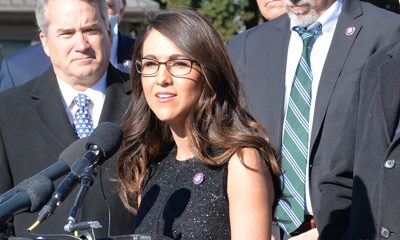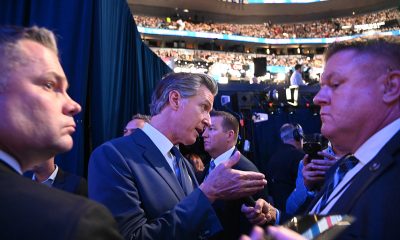Los Angeles
UN honors Cyndi Lauper for human rights and LGBTQ advocacy (interview, photos)
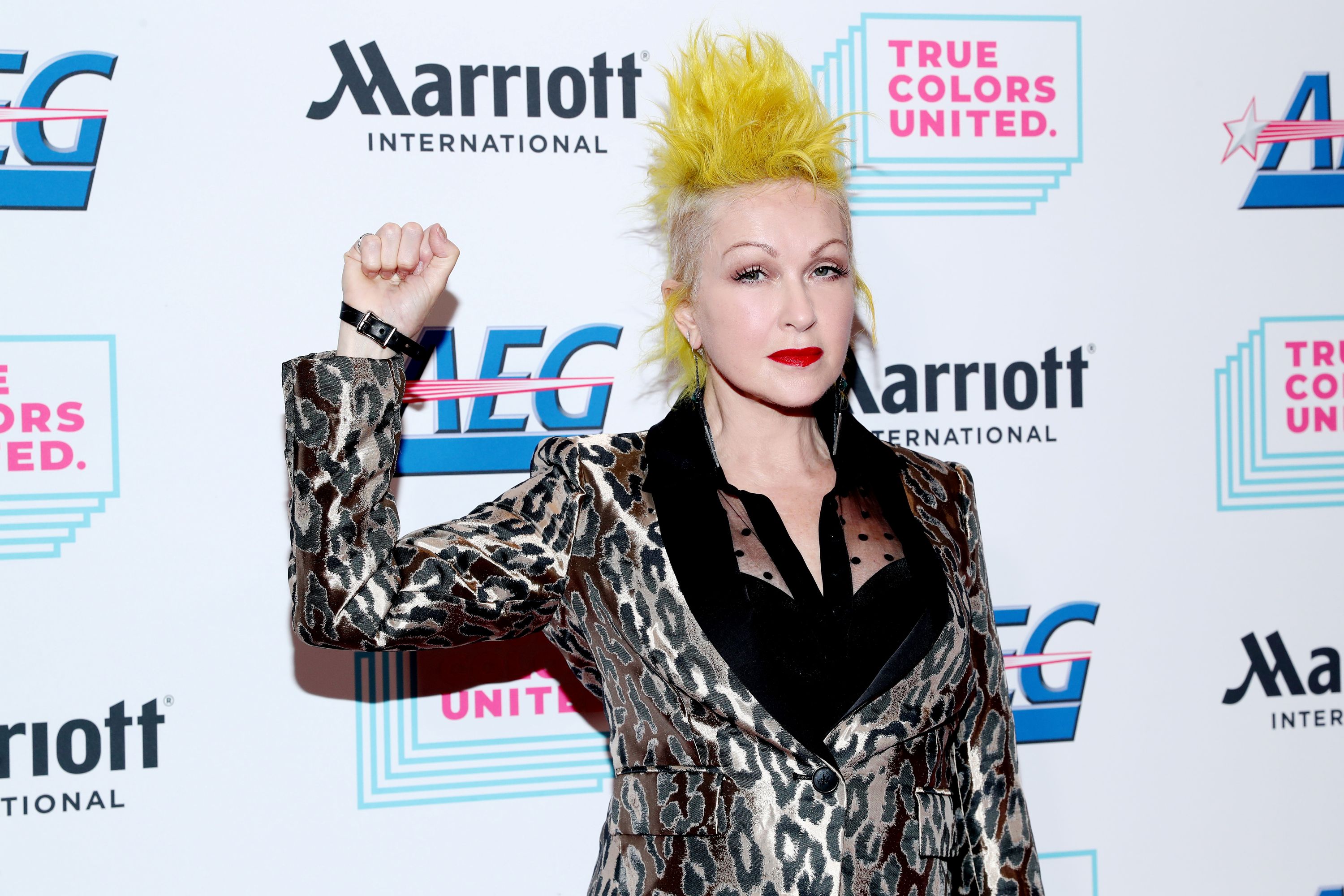
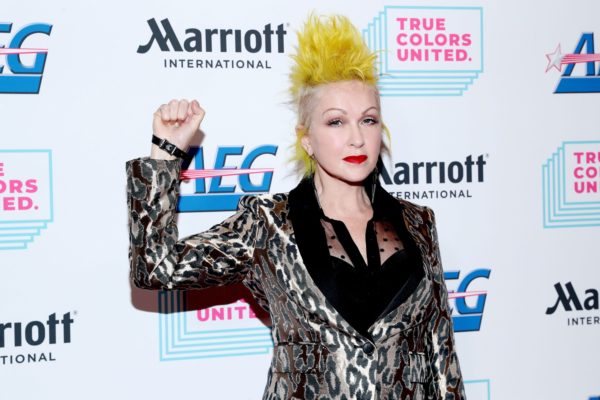
Cyndi Lauper at “Home for the Holidays” in LA Dec 10, 2019. (Photo by Rich Polk/Rich Polk, courtesy True Colors United)
Donald Trump aside, most Americans believe the United Nations tries to peacefully fix global problems. Feminist historians note, for instance, that Eleanor Roosevelt, as the determined chair of the UN Human Rights Commission, crafted the Universal Declaration of Human Rights and wooed and cajoled commission members — despite some members’ deeply held misogynistic attitudes toward women — to accept this still relied-upon model of how human beings should behave toward each other.
It is something of a symbolic marvel, then, that in this Trumpian era — 71 years after the UN General Assembly adopted the Declaration, establishing Dec. 10 as Human Rights Day — that the UN came to Los Angeles to present a prize for LGBTQ advocacy, a component of human rights it took the UN decades to acknowledge.
That’s what happened Dec. 10 when Laurent Sauveur, representing the UN office of Human Rights, flew from Switzerland to Los Angeles to present singer, songwriter, actor and LGBTQ icon Cyndi Lauper with the first High Note Global Prize for her LGBTQ advocacy worldwide. The brief ceremony occurred during Lauper’s annual “Home for the Holidays” all-star concert at The Novo benefiting True Colors United, her non-profit organization advocating for LGBTQ homeless youth.
“Today is a very special day. Today is Human Rights Day,” Sauveur said, noting the adoption of the Universal Declaration of Human Rights by the international community. “This is why it is a beautiful symbol to award, on this very day, the first High Note Global Prize to Cyndi Lauper. Cyndi is an artist who is fiercely dedicated to make the promise of the Declaration – that all human beings are born free and equal — the reality for everyone.”
Musicians, the UN representative said, “hold a very special place in society as they have the ability to inspire people to take action. And we are honored to celebrate one of its greatest tonight – Cyndi Lauper. Throughout her career, Cyndi has been an advocate – a remarkable advocate – for women’s rights, and for the rights of the LGBTQ community. She has written and sung their songs and powerfully embodied the cause of equality, touching the lives of millions through her work with True Colors United.”
Other than outbursts of applause, The Novo Theater was still as Sauveur spoke. Yes, entertainment, laughter, and songs by unlikely duets such as Lauper and Marilyn Manson and with Henry Rollins was the call of the evening. But there was also a sense that this event served a transformative higher cause.
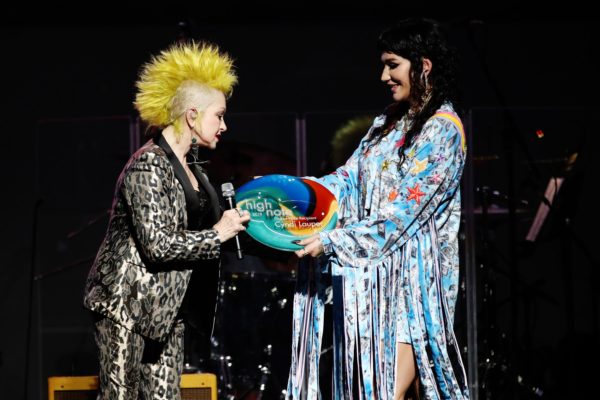
Keish presents Cyndi Lauper with UN High Note Global Prize (Photo by Rich Polk, courtesy True Colors United)
It was there in the catch in Kesha’s voice as she introduced Sauveur before joining him to present the honor. No one who watched the 60th annual Grammy Awards in January 2018 can forget the powerful moment of sisterhood when Lauper and other women clad in suffragette white emotionally backed up a defiant Kesha singing “Praying,” symbolizing the enormity of the #MeToo movement.
“This Global award holds a special place for artists as it’s given to a remarkable person who uses their musical gifts to promote human rights and to speak truth to power,” Kesha said. “As many of you know, Cyndi has spent decades fighting for human rights – for LGBTQ rights – and she has never backed down. A recent example was her testimony to the U.S. Senate in which she secured approximately $250 million in new annual funding to invest in preventing youth homelessness – of which a disproportionate number is LGBTQ youth. Cyndi has stated that ‘we each have a personal responsibility to make sure LGBTQ youth are treated with dignity and respect.’ I couldn’t agree more.”
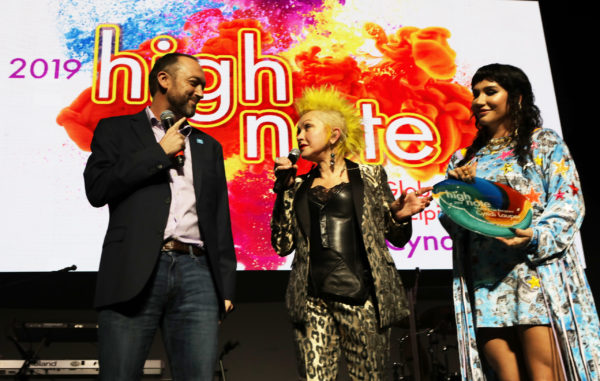
Laurent Sauveur, Chief External Officer of United Nations Human Rights, and pop superstar Kesha presented Cyndi Lauper with the first-ever High Note Global Prize on December 10, 2019 in Los Angeles. (Photo by David Rose)
Lauper took the large multi-color Venetian plate from Keisha, looked at it, turned to Sauveur and said, “This is like some kind of art! It’s a real piece of art!”
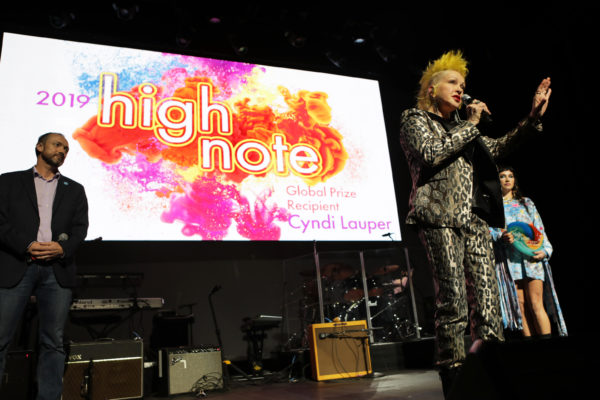
Cyndi Lauper tells the “Home for the Holidays” audience about LGBTQ homeless youth (Photo by David Rose)
Then, in her own passionate fashion, Lauper spiritually channeled human rights activist Eleanor Roosevelt, sharing that her activism is motivated by knowing that 40 percent of the youth among America’s more than 4 million homeless are LGBT kids who are there just because of who they are. But, just as Roosevelt sought a solution for the hatred targeting refugees after World War II, Lauper said she believes the problem of LGBTQ youth homelessness is “fixable.”
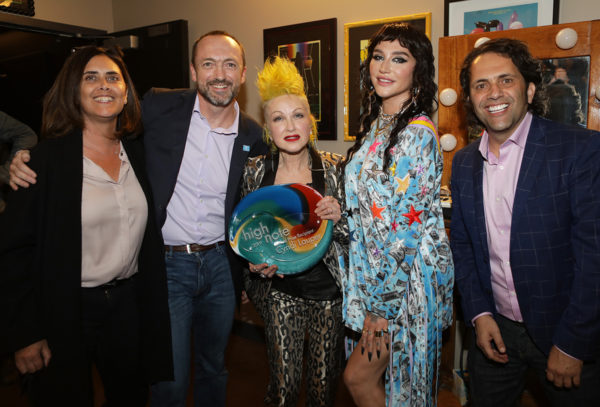
Backstage: Chantel Sausedo, Executive Producer of The High Note Global Initiative; Laurent Sauveur, Chief External Officer of UN Human Rights; Cindy Lauper, High Note Global Prize Laureate; superstar Kesha; and David Clark, Creator of The High Note Global Initiative. (Photo by David Rose)
Greyson Chance gave artistic testimony to Lauper‘s power of inspiration. He sang a ballad about loving someone who does not love you back, such as children who love rejecting parents, and told a story of how, at age 13 in 2011, he and Lauper performed at the Human Rights Campaign gala honoring President Barack Obama.
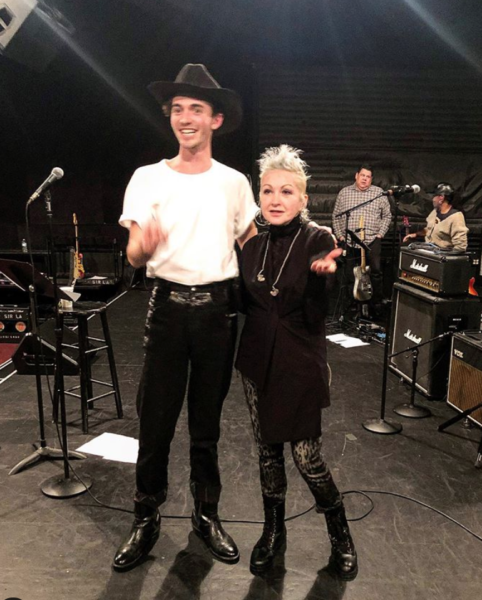
Chance sat between his mother and Lauper when Obama gave an impassioned speech about equality and the work ahead for activists in the civil rights community. Lauper took his shoulder, got New York aggressive and told him to take Obama’s words to heart as the foundation for both his mission in life and of his music. That was a moment of revelation, Chance said, and when he finally did come out as a gay man in Oklahoma and started knocking on doors for Freedom Oklahoma, he thought about Lauper’s inspiration when he felt discouraged and lost. Now 21, he knows he’s one of the lucky ones whose parents did not discard him into the heap of millions of unwanted LGBT youth who live in our streets.
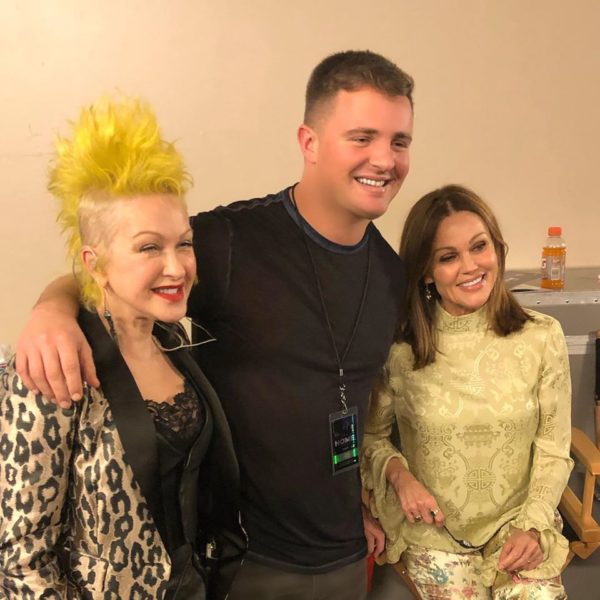
Cyndi Lauper, James Duke Mason, Belinda Carlisle backstage at The Novo at LA Live. (Photo courtesy Duke Mason)
The message resonated. “It was a truly incredible night. Not only for me as the son of one of the performers, but it was amazing as a young gay man to see the outpouring of love and support for the most vulnerable in the LGBTQ community. Incredibly moving and powerful,” longtime West Hollywood activist James Duke Mason told the Los Angeles Blade. Mason’s mother, Belinda Carlisle, sang a duet with Lauper on her LGBTQ anthem “True Colors.”
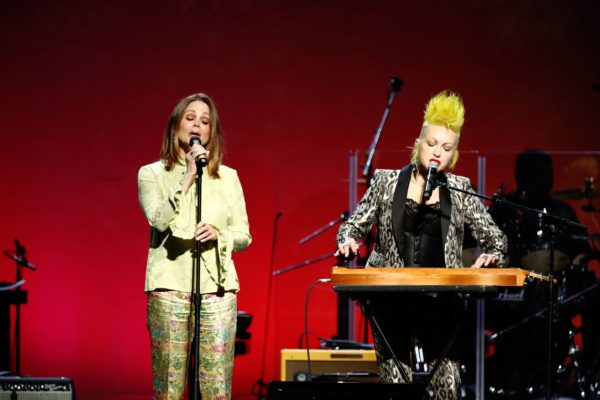
Belinda Carlisle and Cyndi Lauper sing “True Colors” (Photo by Rich Polk, courtesy True Colors United)
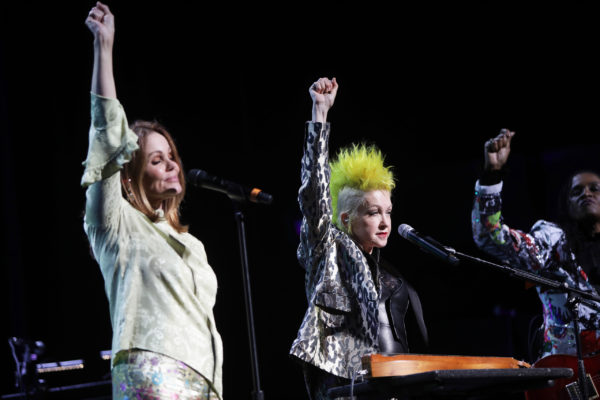
Belinda Carlisle and Cyndi Lauper after singing “True Colors” (Photo by David Rose)
Lauper initially came to the attention of the LGBTQ community in the early 1980s with the playful “Girls Just Want to Have Fun” with a video full of girls of color.
Gay men with AIDS seized the song as a defiantly joyful response to the inevitability of death.
“I saw many of my friends ill. I saw everyone ill. It was unfortunate that at that time the president did not acknowledge AIDS even though his friend Rock Hudson was very ill with it,” Lauper told the Los Angeles Blade in a phone interview. “But yeah, I know that it gave a lot of people joy. I wanted it to.”
And perhaps that’s the simple genius of her soulful connection to humanity: Lauper wants to use her artistic talent to benefit others, as exemplified in this line from “Kinky Boots:” “If your glitter rusts/ Let me raise you up (and up).” In 2013, she made history becoming the first woman to win a Tony Award for best score as a solo female writer for that Broadway hit.
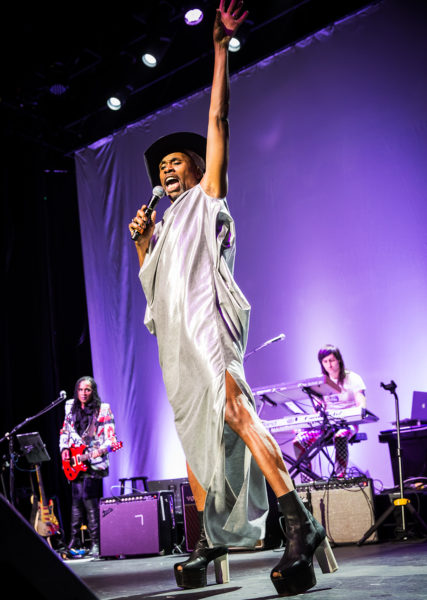
“Kinky Boots” star Billy Porter (Photo by Rich Polk, courtesy True Colors United)
“I’m a friend and family of the community,” Lauper told the Los Angeles Blade. And her life has been enmeshed with the community, through the struggles of her lesbian sister Ellen and her friends, such as her best friend Gregory Natal who had been kicked out of his home at 12 for being gay, survived homelessness on the streets, and subsequently died of AIDS at age 27.
“Blue Angel, Gregory—- his nickname was blue because he had blue eyes,” she said. “We did the ‘She Bop’ video [accidentally inspired by gay porn] together and that was around the time he told me that he had AIDS. And as he got sicker and he was in the hospital, he wanted me to write a song for him like ‘That’s What Friends Are For’ and that’s Burt Bacharach. But I am not Burt Bacharach remotely, one could only aspire to be like that.
“But I wrote about what I knew. So I wrote ‘Boy Blue’ and my grief. And fortunately, that was a song in which I poured out my heart and liver, which is not good for repetitive play,” Lauper said. “I wanted it to be live and I wanted the sound of that drum to have the soul, that archaic part of your soul that you call too, because it was an important song. So I wanted a call to people’s souls and then I wanted to speak to the tender part in their heart. And so that’s why I sung it like that.
“And in the end, it turned out to be just what Gregory wanted because years later I realized that that song helped a lot of people, a lot of different kinds of people, people who were ill, people who were different, people who were so sad,” Lauper said.
Lauper got super creative for her video performance of “The Ballad of Cleo and Joe,” inspired by a “very Fellini-esque” dance troupe of drag performers with whom she’d gone on the road. Very pregnant with her nine pound son, she glued little mirrors on her stomach to make it look like a disco ball and mimed moves while turning on a turntable. “What was I trying to tell my [unborn] son? That it’s an inclusive world and we are who we are and it’s good to embrace who you are and once you accept yourself, you can accept others, too, ” she said.
But it was “True Colors” that brought emails, first one, then another, then an avalanche. “It was all these emails about people who were disenfranchised by their friends, their family, and their jobs. They had nothing, nothing. And they were suicidal and they heard this song and it gave them strength and they were able to not kill themselves. And then I thought, “People killing themselves just because of who they are?” So I called my sister and I talked to her it and I said, “El, when the time comes, you and me, we’ve got to get something about this.” And she said, “Absolutely.” And then when the time came and we did that campaign with PFLAG, Stay Close, we did that together.”
Lauper says her “ah-ha moment” about becoming the kind of artist/activist the UN honors occurred “back in the aughts (2000s) when I heard actually the president at the time speaking as if hate crimes against LGBTs was okay and it’s not okay. And when civil rights was just being pared down and down and down, and that made me first say, ‘You know what? Enough is enough now.’ And anything I could do to use my voice, I felt like, ‘Let’s do this.’”
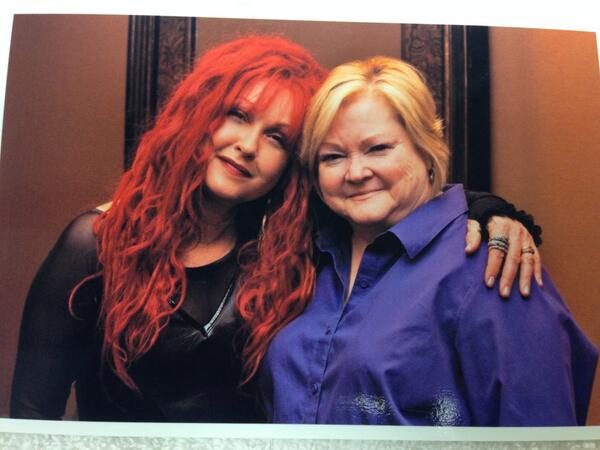
Cyndi Lauper and Judy Shepard in 2014 (Photo from Lauper’s Twitter page)
Meeting Matthew Shepard’s mom Judy Shepherd — she is on the board of the Matthew Shepard Foundation — and meeting Gregory Lewis and Kathy Nelson through the Human Rights Campaign that “really changed my perspective on things,” Lauper said, “because I, at one point, felt like, ‘What the heck? No matter what we do we’re just still pawns here.’ And then I felt that you can do something. I stepped into it and then before I knew it, things were actually changing. We were doing something. We had the inclusive True Colors tours,” focused on “LGBT homeless youth because this is a fixable situation because they’re only homeless because they’re LGBTQ. And that means that with programs and advocacy and helping people get back on their feet and back into society. And it will help society itself because throwing away youth because of who they are is not a solution of any kind, it’s just a very close-minded ignoramus kind of thing.”
Lauper didn’t want to discuss Donald Trump, whom she knew from New York and for whom she says she did not vote. She had not remembered the ads he took out against the Central Park Five, and while he bad mouthed her dear lesbian friend Rosie O’Donnell, she wanted to use her appearance on Season 9 of the “Celebrity Apprentice” to promote and win money for what was then called her True Colors Fund.
But Lauper’s firing in Episode 9, which aired May 9, 2010, prefigured behavior Americans now see since the Trumps moved into the White House. Lauper was fired “for telling Mr. Trump that the color of the celebrity room, which was the judges’ favorite room and for which Cyndi was given much credit, was actually Holly’s idea. Cyndi was also criticized for bossing around the men who had come to work on the apartment,” according to an analysis on Wikipedia.
Apparently judge Don Jr. wanted to fire Holly Robinson-Peete, until Lauper told the truth, which Trump’s son called a “tactical mistake.” As she exited, Lauper as the experience was “like high school.”
“Well, [Trump’s] son said that it was not easy being his son, which obviously it’s not. But I think that I just would have had no idea. I have no comment on that,” Lauper told the Los Angeles Blade. “I want to stay in the politics of uniting people, not separating them.
“I do believe in the Constitution. I really do,” Lauper said. “I don’t care if you’re Republican or Democrat or liberal – what the heck, we’re all Americans. And as long as we can talk together, we can solve things together and that’s what we’re supposed to do. And we have a Constitution that protects us with checks and balances and that’s what we should believe in and that’s what I believe in. That’s what I was taught since I was a kid.
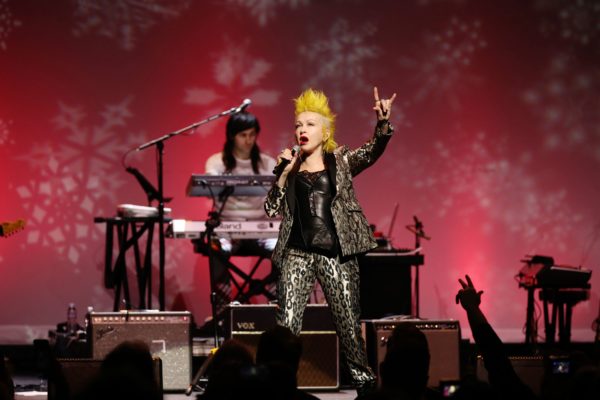
Cyndi Lauper singing at “Home for the Holidays” concert Dec. 10, 2019 in LA (Photo by Rich Polk, courtesy True Colors United)
“I have nothing to say about the President,” Lauper said. “I only have something to say about what we can fix in this country together and we can help each other. And you don’t throw youth away, ever. And the most fixable, logical fix is the LGBTQ kids because they’re just there because they’re LGBTQ, which is not a problem. The only problem is they’re homeless and they need to be helped. And they’re the most vulnerable, too. Because these youths have other issues. And so once we learn about this most complex issue, we fix that then the others are easier to fix, you understand?…We need the advocacy, the programs, and a helping hand.
“If your glitter rusts, let me raise you up,” Lauper adds, quoting a line from “Kinky Boots.”
One imagines Eleanor Roosevelt would have cheered Cyndi Lauper being awarded a human rights award by the United Nations.
Los Angeles
Los Angeles Blade names new publisher
Alexander Rodriguez brings deep media, business experience to outlet
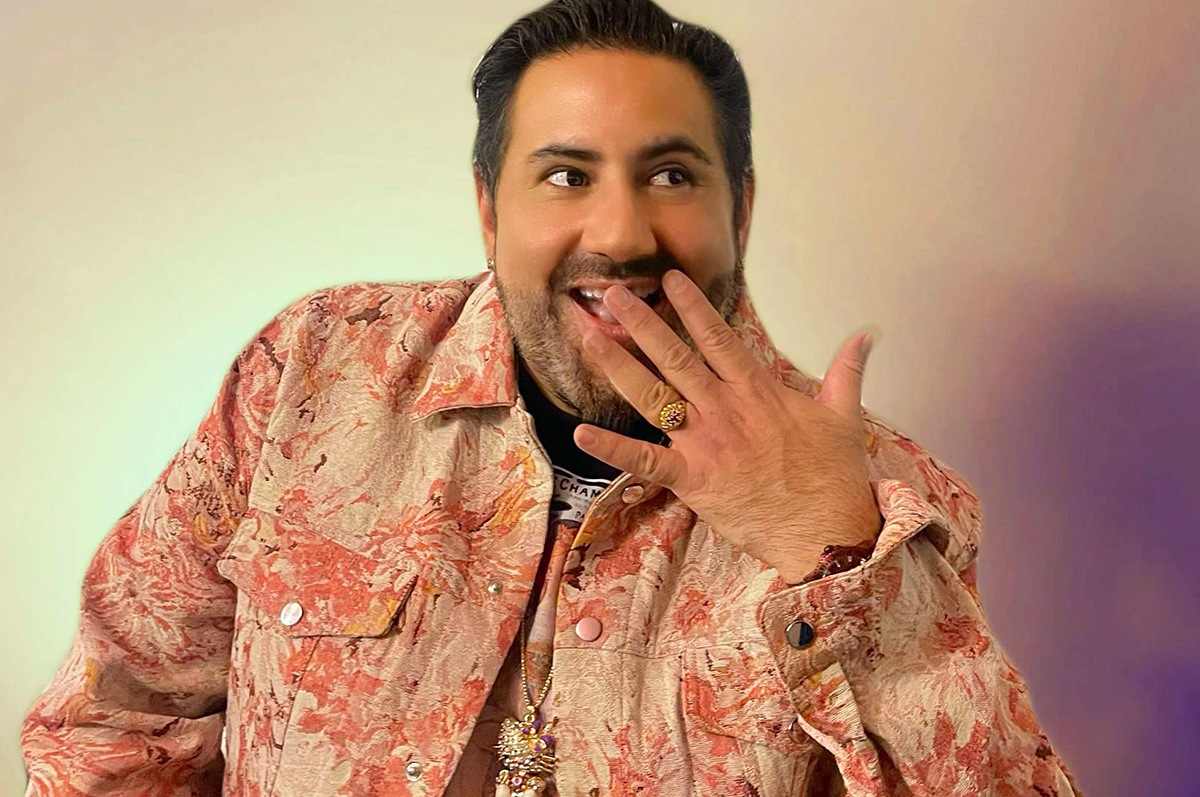
The Los Angeles Blade, Southern California’s leading LGBTQ news outlet, today announced the appointment of a new publisher, Alexander Rodriguez.
Rodriguez has a long background in queer media, business development, and a deep commitment to the Los Angeles community. He has worked as a lead writer and podcast host for Metrosource Magazine and for GED Magazine; content director for FleshBot Gay; and as host and producer for the “On the Rocks” podcast. On the business side, Rodriguez spent years working in business development in the banking industry throughout Los Angeles. He also has an extensive background in event planning and management and has served on the boards of many LGBTQ non-profits. As a TV and radio personality, he has served as emcee for LGBTQ events around the nation.
“I’m excited to bring my diverse media and business experience to the Los Angeles Blade,” Rodriguez said. “We will continue the Blade’s mission of serving as our community’s news outlet of record during these challenging times and work toward building bridges within our community and beyond.”
Rodriguez starts in his new role on Monday, Feb. 3.
“We are thrilled to welcome Alexander to the Blade team,” said Kevin Naff, one of the owners of the Los Angeles Blade. “His multimedia and business side experience will help us grow the Blade in L.A. and continue our commitment to best-in-class journalism serving the LGBTQ community in Southern California.”
Rodriguez becomes the Los Angeles Blade’s second publisher following the unexpected death of founding publisher Troy Masters in December. Masters served in the role for nearly eight years. The community will come together for a celebration of Masters’s life on Monday, Feb. 10, 7-9 p.m. at the Abbey.
“Troy’s legacy is in good hands with Alexander at the helm alongside our new local news editor, Gisselle Palomera,” Naff added.
The Los Angeles Blade, launched in 2017, celebrates its eighth anniversary in March. It is the sister publication of the Washington Blade, founded in 1969, which offers unmatched coverage of queer political news and is the only LGBTQ outlet in the White House press pool and the White House Correspondents’ Association, and the only LGBTQ outlet with a dedicated seat in the White House briefing room.
Alexander Rodriguez can be reached at [email protected].
Los Angeles
Broadway Cares/Equity Fights AIDS donates $500K to wildfire relief effort
Four local organizations received emergency grants

Broadway Cares/Equity Fights AIDS on Monday announced it has awarded $500,000 in emergency grants to organizations that are responding to the Los Angeles wildfires.
A press release notes the Entertainment Community Fund received $250,000, the California Fire Foundation Wildfire and Disaster Relief Fund received $100,000, the Los Angeles Regional Food Bank received $100,000, and Project Angel Food received $50,000.
“All of these organizations are providing much-needed, on-the-ground support for residents and first responders,” said Broadway Cares/Equity Fights AIDS.
“Our compassionate community knows the power of coming together in times of need,” added Broadway Cares Executive Director Danny Whitman. “Because of the generosity of the theater community — those onstage, backstage and in the audience — these emergency grants will immediately provide meals, shelter, medical care, clothing and emergency financial assistance, all first steps on the long road toward recovering, rebuilding, and healing.”
Los Angeles
The dedicated life and tragic death of gay publisher Troy Masters
‘Always working to bring awareness to causes larger than himself’

Troy Masters was a cheerleader. When my name was called as the Los Angeles Press Club’s Print Journalist of the Year for 2020, Troy leapt out of his seat with a whoop and an almost jazz-hand enthusiasm, thrilled that the mainstream audience attending the Southern California Journalism Awards gala that October night in 2021 recognized the value of the LGBTQ community’s Los Angeles Blade.
That joy has been extinguished. On Wednesday, Dec. 11, after frantic unanswered calls from his sister Tammy late Monday and Tuesday, Troy’s longtime friend and former partner Arturo Jiminez did a wellness check at Troy’s L.A. apartment and found him dead, with his beloved dog Cody quietly alive by his side. The L.A. Coroner determined Troy Masters died by suicide. No note was recovered. He was 63.
Considered smart, charming, committed to LGBTQ people and the LGBTQ press, Troy’s inexplicable suicide shook everyone, even those with whom he sometimes clashed.
Troy’s sister and mother – to whom he was absolutely devoted – are devastated. “We are still trying to navigate our lives without our precious brother/son. I want the world to know that Troy was loved and we always tried to let him know that,” says younger sister Tammy Masters.
Tammy was 16 when she discovered Troy was gay and outed him to their mother. A “busy-body sister,” Tammy picked up the phone at their Tennessee home and heard Troy talking with his college boyfriend. She confronted him and he begged her not to tell.
“Of course, I ran and told Mom,” Tammy says, chuckling during the phone call. “But she – like all mothers – knew it. She knew it from an early age but loved him unconditionally; 1979 was a time [in the Deep South] when this just was not spoken of. But that didn’t stop Mom from being in his corner.”
Mom even marched with Troy in his first Gay Pride Parade in New York City. “Mom said to him, ‘Oh, my! All these handsome men and not one of them has given me a second look! They are too busy checking each other out!” Tammy says, bursting into laughter. “Troy and my mother had that kind of understanding that she would always be there and always have his back!
“As for me,” she continues, “I have lost the brother that I used to fight for in any given situation. And I will continue to honor his cause and lifetime commitment to the rights and freedom for the LGBTQ community!”
Tammy adds: “The outpouring of love has been comforting at this difficult time and we thank all of you!”
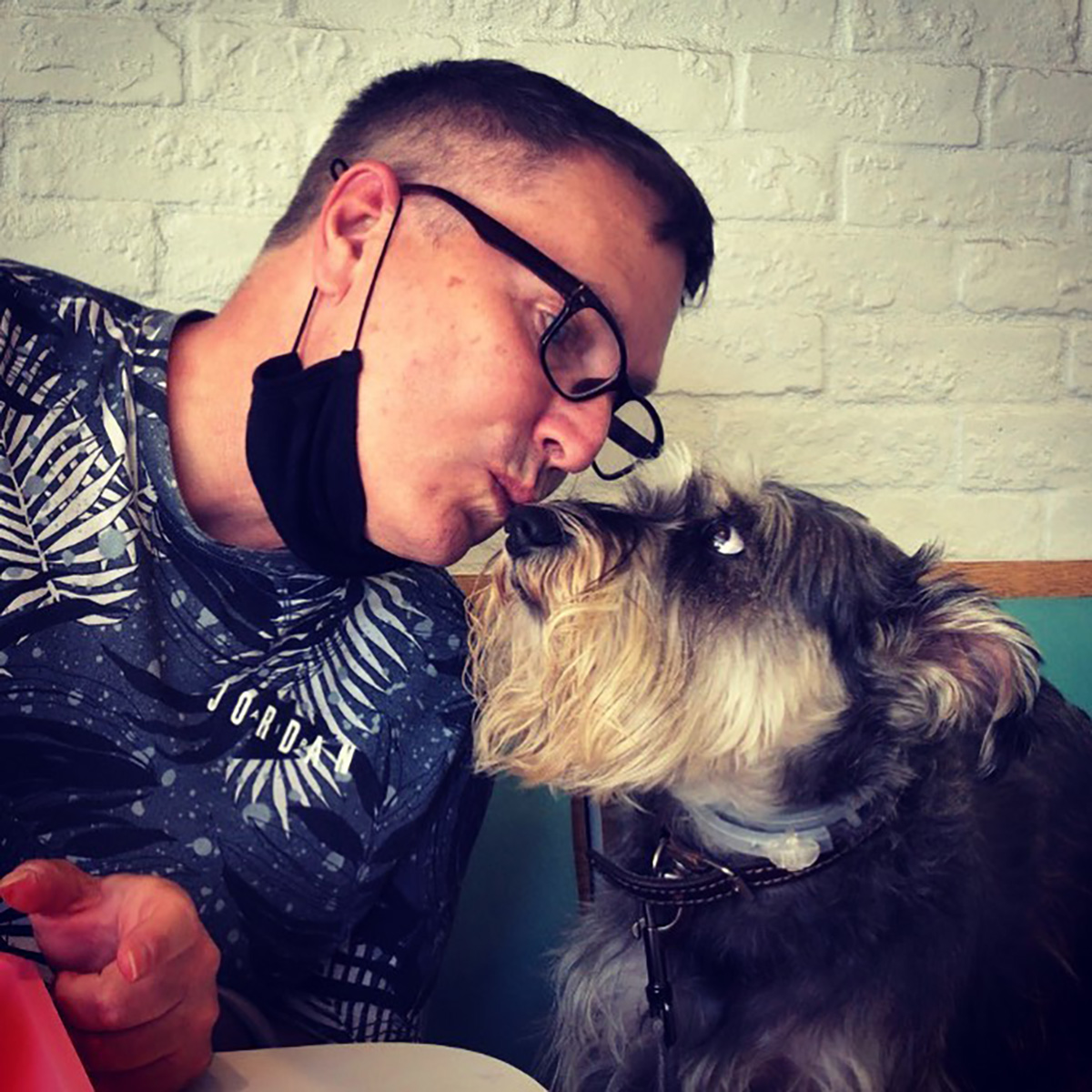
No one yet knows why Troy took his life. We may never know. But Troy and I often shared our deeply disturbing bouts with drowning depression. Waves would inexplicitly come upon us, triggered by sadness or an image or a thought we’d let get mangled in our unresolved, inescapable past trauma.
We survived because we shared our pain without judgment or shame. We may have argued – but in this, we trusted each other. We set everything else aside and respectfully, actively listened to the words and the pain within the words.
Listening, Indian philosopher Krishnamurti once said, is an act of love. And we practiced listening. We sought stories that led to laughter. That was the rope ladder out of the dark rabbit hole with its bottomless pit of bullying and endless suffering. Rung by rung, we’d talk and laugh and gripe about our beloved dogs.
I shared my 12 Step mantra when I got clean and sober: I will not drink, use or kill myself one minute at a time. A suicide survivor, I sought help and I urged him to seek help, too, since I was only a loving friend – and sometimes that’s not enough.
(If you need help, please reach out to talk with someone: call or text 988 Suicide and Crisis Lifeline. They also have services in Spanish and for the deaf.)
In 2015, Troy wrote a personal essay for Gay City News about his idyllic childhood in the 1960s with his sister in Nashville, where his stepfather was a prominent musician. The people he met “taught me a lot about having a mission in life.”
During summers, they went to Dothan, Ala., to hang out with his stepfather’s mother, Granny Alabama. But Troy learned about “adult conversation — often filled with derogatory expletives about Blacks and Jews” and felt “my safety there was fragile.”
It was a harsh revelation. “‘Troy is a queer,’ I overheard my stepfather say with energetic disgust to another family member,” Troy wrote. “Even at 13, I understood that my feelings for other boys were supposed to be secret. Now I knew terror. What my stepfather said humiliated me, sending an icy panic through my body that changed my demeanor and ruined my confidence. For the first time in my life, I felt depression and I became painfully shy. Alabama became a place, not of love, not of shelter, not of the magic of family, but of fear.”
At the public pool, “kids would scream, ‘faggot,’ ‘queer,’ ‘chicken,’ ‘homo,’ as they tried to dunk my head under the water. At one point, a big crowd joined in –– including kids I had known all my life –– and I was terrified they were trying to drown me.
“My depression became dangerous and I remember thinking of ways to hurt myself,” Troy wrote.
But Troy Masters — who left home at 17 and graduated from the University of Tennessee at Knoxville — focused on creating a life that prioritized being of service to his own intersectional LGBTQ people. He also practiced compassion and last August, Troy reached out to his dying stepfather. A 45-minute Facetime farewell turned into a lovefest of forgiveness and reconciliation.
Troy discovered his advocacy chops as an ad representative at the daring gay and lesbian activist publication Outweek from 1989 to 1991.
“We had no idea that hiring him would change someone’s life, its trajectory and create a lifelong commitment” to the LGBTQ press, says Outweek’s co-founder and former editor-in-chief Gabriel Rotello, now a TV producer. “He was great – always a pleasure to work with. He had very little drama – and there was a lot of drama at Outweek. It was a tumultuous time and I tended to hire people because of their activism,” including Michelangelo Signorile, Masha Gessen, and Sarah Pettit.
Rotello speculates that because Troy “knew what he was doing” in a difficult profession, he was determined to launch his own publication when Outweek folded. “I’ve always been very happy it happened that way for Troy,” Rotello says. “It was a cool thing.”
Troy and friends launched NYQ, renamed QW, funded by record producer and ACT UP supporter Bill Chafin. QW (QueerWeek) was the first glossy gay and lesbian magazine published in New York City featuring news, culture, and events. It lasted for 18 months until Chafin died of AIDS in 1992 at age 35.
The horrific Second Wave of AIDS was peaking in 1992 but New Yorkers had no gay news source to provide reliable information at the epicenter of the epidemic.
“When my business partner died of AIDS and I had to close shop, I was left hopeless and severely depressed while the epidemic raged around me. I was barely functioning,” Troy told VoyageLA in 2018. “But one day, a friend in Moscow, Masha Gessen, urged me to get off my back and get busy; New York’s LGBT community was suffering an urgent health care crisis, fighting for basic legal rights and against an increase in violence. That, she said, was not nothing and I needed to get back in the game.”
It took Troy about two years to launch the bi-weekly newspaper LGNY (Lesbian and Gay New York) out of his East Village apartment. The newspaper ran from 1994 to 2002 when it was re-launched as Gay City News with Paul Schindler as co-founder and Troy’s editor-in-chief for 20 years.

“We were always in total agreement that the work we were doing was important and that any story we delved into had to be done right,” Schindler wrote in Gay City News.
Though the two “sometimes famously crossed swords,” Troy’s sudden death has special meaning for Schindler. “I will always remember Troy’s sweetness and gentleness. Five days before his death, he texted me birthday wishes with the tag, ‘I hope you get a meaningful spanking today.’ That devilishness stays with me.”
Troy had “very high EI (Emotional Intelligence), Schindler says in a phone call. “He had so much insight into me. It was something he had about a lot of people – what kind of person they were; what they were really saying.”
Troy was also very mischievous. Schindler recounts a time when the two met a very important person in the newspaper business and Troy said something provocative. “I held my breath,” Schindler says. “But it worked. It was an icebreaker. He had the ability to connect quickly.”
The journalistic standard at LGNY and Gay City News was not a question of “objectivity” but fairness. “We’re pro-gay,” Schindler says, quoting Andy Humm. “Our reporting is clear advocacy yet I think we were viewed in New York as an honest broker.”
Schindler thinks Troy’s move to Los Angeles to jump-start his entrepreneurial spirit and reconnect with Arturo, who was already in L.A., was risky. “He was over 50,” Schindler says. “I was surprised and disappointed to lose a colleague – but he was always surprising.”
“In many ways, crossing the continent and starting a print newspaper venture in this digitally obsessed era was a high-wire, counter-intuitive decision,” Troy told VoyageLA. “But I have been relentlessly determined and absolutely confident that my decades of experience make me uniquely positioned to do this.”
Troy launched The Pride L.A. as part of the Mirror Media Group, which publishes the Santa Monica Mirror and other Westside community papers. But on June 12, 2016, the day of the Pulse Nightclub shooting in Orlando, Fla., Troy said he found MAGA paraphernalia in a partner’s office. He immediately plotted his exit. On March 10, 2017, Troy and the “internationally respected” Washington Blade announced the launch of the Los Angeles Blade.

In a March 23, 2017 commentary promising a commitment to journalistic excellence, Troy wrote: “We are living in a paradigm shifting moment in real time. You can feel it. Sometimes it’s overwhelming. Sometimes it’s toxic. Sometimes it’s perplexing, even terrifying. On the other hand, sometimes it’s just downright exhilarating. This moment is a profound opportunity to reexamine our roots and jumpstart our passion for full equality.”
Troy tried hard to keep that commitment, including writing a personal essay to illustrate that LGBTQ people are part of the #MeToo movement. In “Ending a Long Silence,” Troy wrote about being raped at 14 or 15 by an Amtrak employee on “The Floridian” traveling from Dothan, Ala., to Nashville.
“What I thought was innocent and flirtatious affection quickly turned sexual and into a full-fledged rape,” Troy wrote. “I panicked as he undressed me, unable to yell out and frozen by fear. I was falling into a deepening shame that was almost like a dissociation, something I found myself doing in moments of childhood stress from that moment on. Occasionally, even now.”
From the personal to the political, Troy Masters tried to inform and inspire LGBTQ people.
Richard Zaldivar, founder and executive director of The Wall Las Memorias Project, enjoyed seeing Troy at President Biden’s Pride party at the White House.
“Just recently he invited us to participate with the LA Blade and other partners to support the LGBTQ forum on Asylum Seekers and Immigrants. He cared about underserved community. He explored LGBTQ who were ignored and forgotten. He wanted to end HIV; help support people living with HIV but most of all, he fought for justice,” Zaldivar says. “I am saddened by his loss. His voice will never be forgotten. We will remember him as an unsung hero. May he rest in peace in the hands of God.”
Troy often featured Bamby Salcedo, founder, president/CEO of TransLatina Coalition, and scores of other trans folks. In 2018, Bamby and Maria Roman graced the cover of the Transgender Rock the Vote edition.
“It pains me to know that my dear, beautiful and amazing friend Troy is no longer with us … He always gave me and many people light,” Salcedo says. “I know that we are living in dark times right now and we need to understand that our ancestors and transcestors are the one who are going to walk us through these dark times… See you on the other side, my dear and beautiful sibling in the struggle, Troy Masters.”
“Troy was immensely committed to covering stories from the LGBTQ community. Following his move to Los Angeles from New York, he became dedicated to featuring news from the City of West Hollywood in the Los Angeles Blade and we worked with him for many years,” says Joshua Schare, director of Communications for the City of West Hollywood, who knew Troy for 30 years, starting in 1994 as a college intern at OUT Magazine.
“Like so many of us at the City of West Hollywood and in the region’s LGBTQ community, I will miss him and his day-to-day impact on our community.”

“Troy Masters was a visionary, mentor, and advocate; however, the title I most associated with him was friend,” says West Hollywood Mayor John Erickson. “Troy was always a sense of light and working to bring awareness to issues and causes larger than himself. He was an advocate for so many and for me personally, not having him in the world makes it a little less bright. Rest in Power, Troy. We will continue to cause good trouble on your behalf.”
Erickson adjourned the WeHo City Council meeting on Monday in his memory.
Masters launched the Los Angeles Blade with his partners from the Washington Blade, Lynne Brown, Kevin Naff, and Brian Pitts, in 2017.
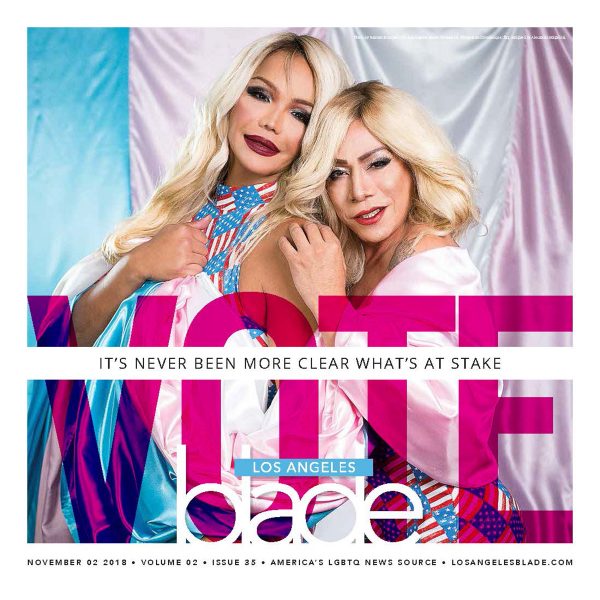
“Troy’s reputation in New York was well known and respected and we were so excited to start this new venture with him,” says Naff. “His passion and dedication to queer LA will be missed by so many. We will carry on the important work of the Los Angeles Blade — it’s part of his legacy and what he would want.”
AIDS Healthcare Foundation President Michael Weinstein, who collaborated with Troy on many projects, says he was “a champion of many things that are near and dear to our heart,” including “being in the forefront of alerting the community to the dangers of Mpox.”
“All of who he was creates a void that we all must try to fill,” Weinstein says. “His death by suicide reminds us that despite the many gains we have made, we’re not all right a lot of the time. The wounds that LGBT people have experienced throughout our lives are yet to be healed even as we face the political storm clouds ahead that will place even greater burdens on our psyches.”
May the memory and legacy of Troy Masters be a blessing.
Veteran LGBTQ journalist Karen Ocamb served as the news editor and reporter for the Los Angeles Blade.
Los Angeles
Los Angeles Blade publisher Troy Masters dies at 63
Longtime advocate for LGBTQ equality, queer journalism
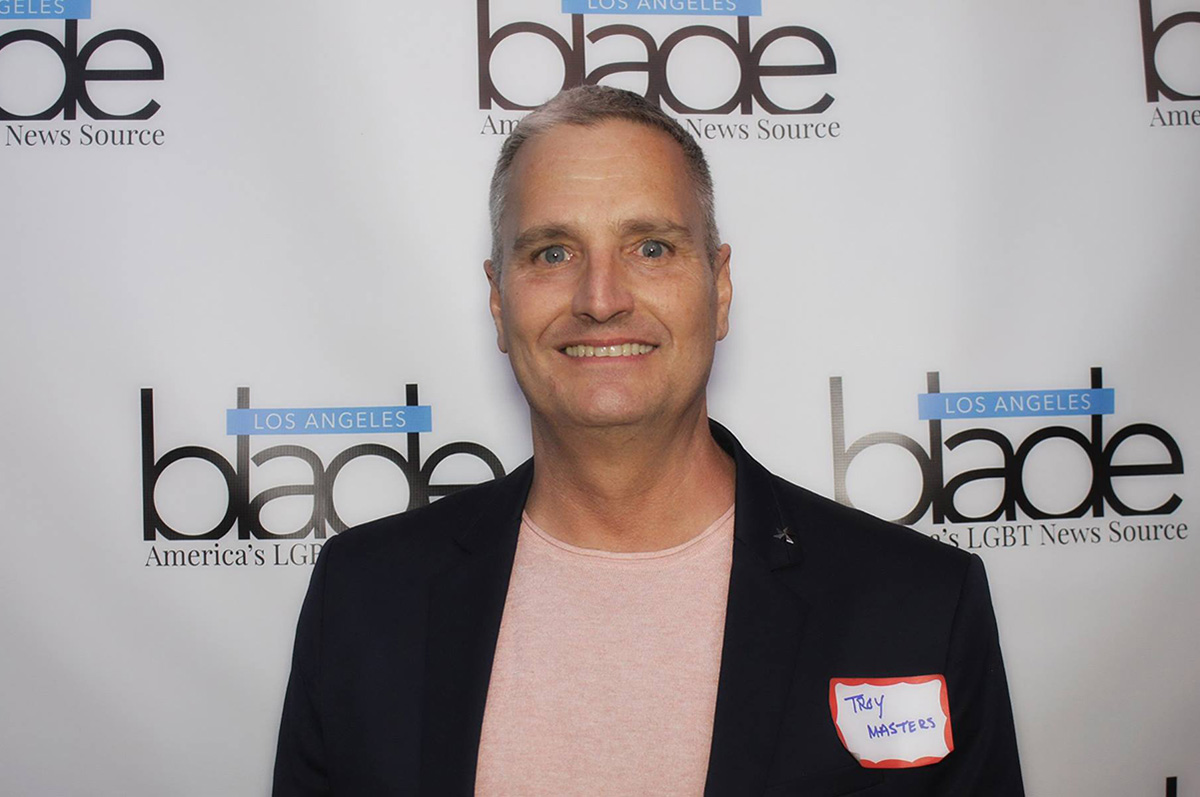
Troy Masters, publisher of the Los Angeles Blade, died unexpectedly on Wednesday Dec. 11, according to a family member. He was 63. The cause of death was not immediately released.
Masters is a well-respected and award-winning journalist and publisher with decades of experience, mostly in LGBTQ media. He founded Gay City News in New York City in 2002 and relocated to Los Angeles in 2015. In 2017, he became the founding publisher of the Los Angeles Blade, a sister publication of the Washington Blade, the nation’s oldest LGBTQ newspaper.
His family released a statement to the Blade on Thursday.
“We are shocked and devastated by the loss of Troy,” the statement says. “He was a tireless advocate for the LGBTQ community and leaves a tremendous legacy of fighting for social justice and equality. We ask for your prayers and for privacy as we mourn this unthinkable loss. We will announce details of a celebration of life in the near future.”
The Blade management team released the following statement on Thursday:
“All of us at the Los Angeles Blade and Washington Blade are heartbroken by the loss of our colleague. Troy Masters is a pioneer who championed LGBTQ rights as well as best-in-class journalism for our community. We will miss his passion and his tireless dedication to the Los Angeles queer community.
“We would like to thank the readers, advertisers, and supporters of the Los Angeles Blade, which will continue under the leadership of our local editor Gisselle Palomera, the entire Blade family in D.C. and L.A., and eventually under a new publisher.”
Troy Masters was born April 13, 1961 and is survived by his mother Josie Kirkland and his sister Tammy Masters, along with many friends and colleagues across the country. This is a developing story and will be updated as more details emerge.

Los Angeles
Ysabel Jurado claims victory: A new era for Los Angeles City Council District 14
The LGBTQ+ candidate maintained steady lead over incumbent Kevin De León, eventually declaring victory
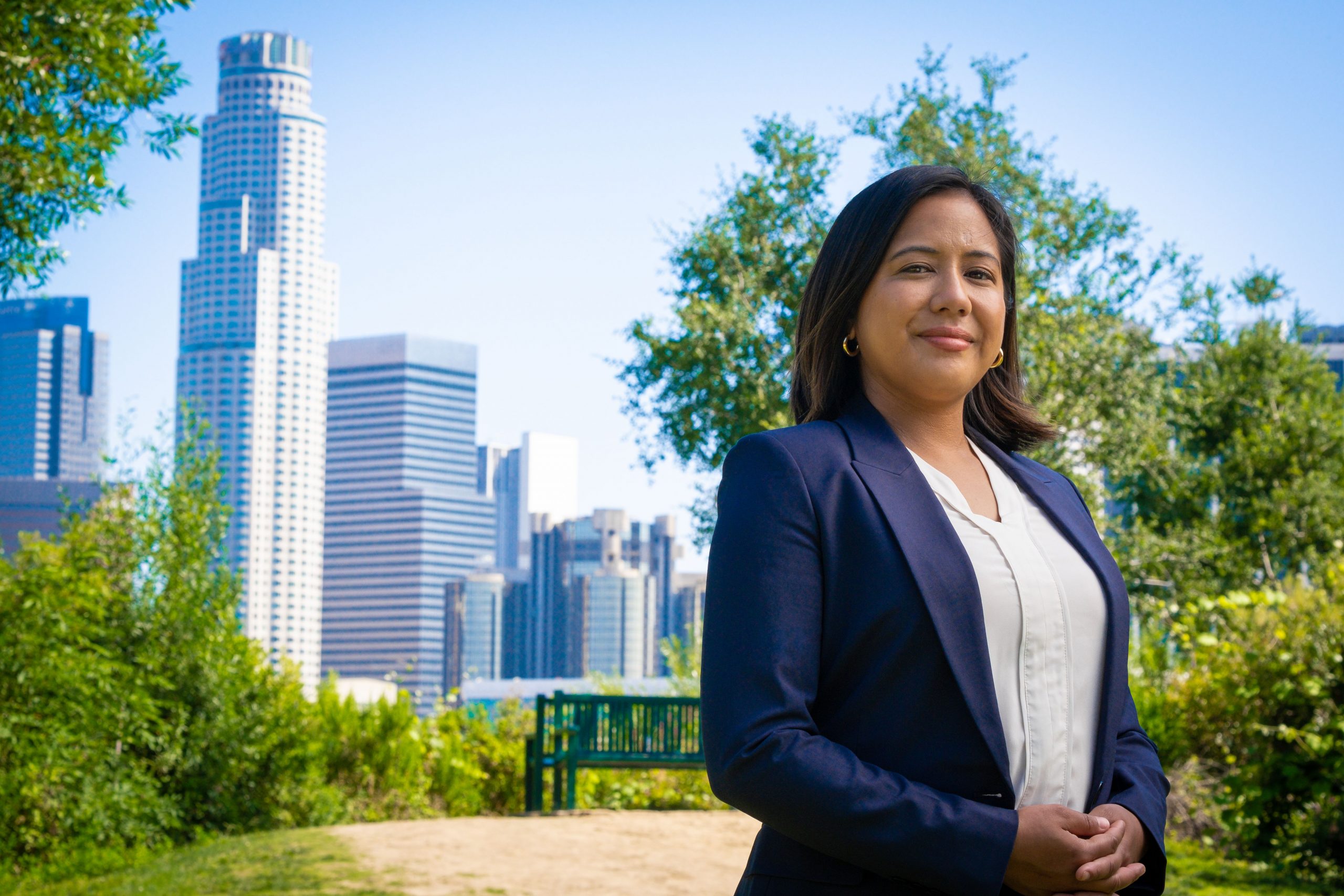
Ysabel Jurado, the Highland Park resident and tenants rights’ attorney, is now Councilmember of Council District 14 after a battle for the hot seat against incumbent Kevin De León.
“Today, I am humbled to officially declare victory in the race for Los Angeles City Council District 14. This win is not mine—it belongs to our community,” said Jurado shortly after the win was announced.
Jurado makes history as the first Filipino American to serve on the Council and has expanded LGBTQ+ and women’s representation too.
In her celebratory statement after Thursday’s win, she stated that De León used Trump-like tactics and she is glad the city did not play into it.
“Trumpism has no place in CD-14– and we proved that by resoundingly rejecting the divisive tactics deployed by our opponent–tactics adopted directly from the Trump playbook,” said Jurado. “Like Trump, our opponent thumbed his nose at the law—from his racist gerrymandering scandal that likely violated the Voting Rights Act– to the current open investigation into his campaign for money laundering.”
Jurado is the new hope for a city that has been marred by racial and phobic remarks by those previously and still in positions of power.
Other news outlets are reporting that this marks another fallen Latino leader after the leaked L.A. City Council audio recording went viral in 2021 and led to the resignation of Los Angeles City Council president Nury Martínez.
De León’s goal during his term was to retain and expand Latin American political power.
With De León out, that leaves Latin Americans taking up only four out of the Council’s 15 seats, in a city that has a majority Latin American population. The city’s biggest Mexican American communities like Boyle Heights and El Sereno will not have a Latin American leader for the first time in nearly 40 years.
During De León’s campaign, he urged voters that if Jurado were to be elected, it would come at the expense of Latin American voices.
Last month, Eastside voters received a text message from De León’s campaign saying: ‘Forty years of Latino political power is under threat.’
Jurado secured her victory after placing first in the March primary, with support from Latin American politicians like Councilmember Hugo Soto-Martínez, L.A. Unified School District trustee Rocio Rivas, L.A. County Supervisor Hilda Solis and Councilmember Eunisses Hernandez, who replaced incumbent Gil Cedillo after he was also caught on audio making racist and defamatory remarks.
“These are heavy times, but Ysabel Jurado’s win is an incredible cause for hope,” said Hernandez in a congratulatory post on Instagram. “She has proven again and again that our city has not just the capacity to dream of a better future for ourselves, but that we demand it.”
De León tapped into the pathos of Eastside residents during his campaign, resorting to political tactics that attacked Jurado directly, rather than tackling the key issues at hand.
“Like Trump, he relied upon fear mongering, red-baiting, misogyny, and racial dog-whistling in an effort to divide us. But unlike Trump, his tactics failed.”
Los Angeles
Los Angeles opens nation’s first transgender vote center
Activists, local officials attended opening
In a landmark development for electoral accessibility, Los Angeles County has opened the doors to the nation’s first general election Vote Center located within a transgender establishment. The Connie Norman Transgender Empowerment Center officially launched its voting facilities today, inviting the local trans community and all registered voters in Los Angeles County to participate in the democratic process.
The Vote Center at CONOTEC will operate for early voting from Nov. 2 – Nov. 5 from 8 a.m. to 8 p.m. Registered voters in Los Angeles County can cast their ballot at CONOTEC, regardless of their residential address. This initiative not only creates a safe and affirming space for marginalized voters but also aims to foster broader community engagement.
During the grand opening, Los Angles County Registrar Dean Logan and West Hollywood Mayor John Erickson, celebrated this significant moment.
Logan said, “The county and everyone in my office know that we need to make voting as accessible and welcoming as possible in every corner of the county. The CONOTEC leadership has done a great job preparing this Vote Center, and we thank them for opening their space to their community and all of the LA County residents who chose to vote here.”
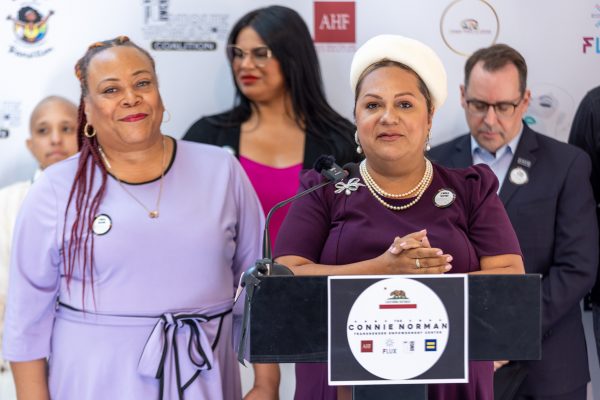
Queen Victoria Ortega (at podium), president of FLUX International, addressed the need for more action.
“We are tired of everyone discussing our safety while doing nothing about it. Now, we are taking matters into our own hands,” Ortega said. “We, the trans community, have created a safe space for the most marginalized to vote, and when you do that, you create a safe place for all. We are honored and duty-bound to be the first presidential election Vote Center in America at a transgender establishment.”
Queen Chela Demuir, executive director of the Unique Women’s Coalition, emphasized the historical legacy of trans rights activists.
“In the spirit of Marsha P. Johnson and Sylvia Rivera, we honor our transcestors and carry their legacy forward,” she said. “This voting center stands as a safe and welcoming space for our trans siblings, while also embracing all allies and residents of Los Angeles County. It’s a space where everyone’s voice matters, uplifting and empowering our community.”
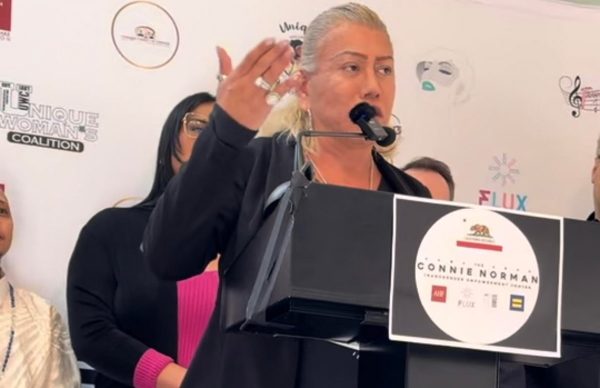
Bamby Salcedo, founder and CEO of the TransLatin@ Coalition. (Photo by Troy Masters)
Bamby Salcedo, founder and CEO of the TransLatin@ Coalition, expressed her support for the initiative, stating, “My sisters at CONOTEC have done a great service to our community by securing this Vote Center. We all look forward to casting our vote in our community and appreciate the support as we work towards equality for all.”
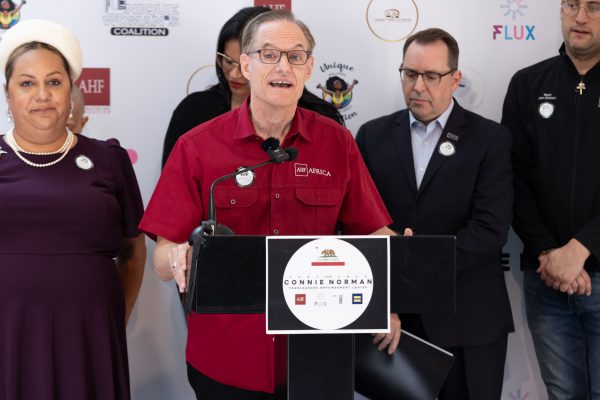
Michael Weinstein, president and CEO of AIDS Healthcare Foundation, the world’s largest and most influential AIDS Service organization, pointed out that around the world voting is a perilous adventure for LGB and particularly trans people. “AIDS Healthcare Foundation is in 47 countries around the world and in so many of those countries, the right to vote does not exist,” he said. “It turns my stomach to see on TV political ads targeting the trans community.” hightlighting the need for safe voting spaces like the CONOTEC.
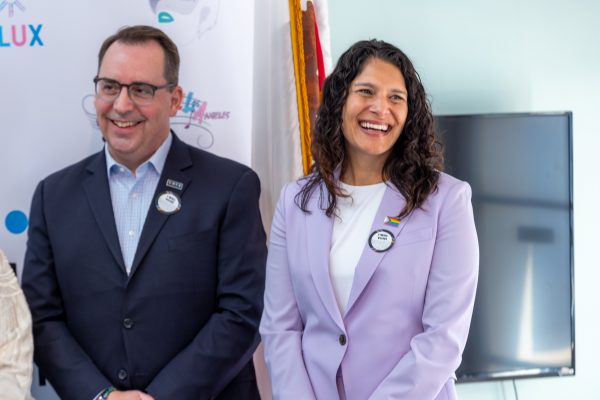
Kelley Robinson, president of the Human Rights Campaign, praised CONOTEC’s efforts to empower LGBTQ+ voters. “With our vote, each of us has the chance to write the next chapter of this nation’s story. And the nation’s story is incomplete without each one of us. When we show up, equality wins,” Robinson remarked, emphasizing the importance of collective civic participation.
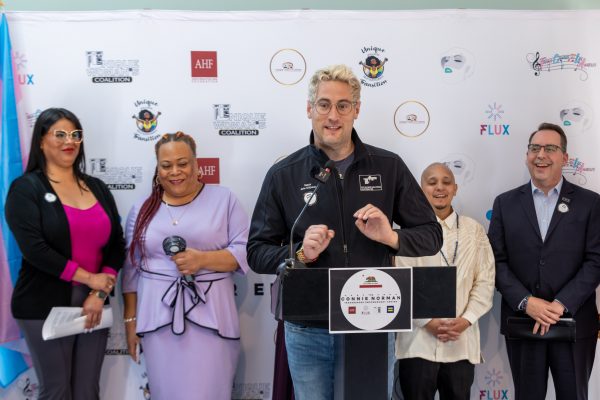
Features
The little idea that could: These queer, Latinx, DJs are shifting the scene in LA
‘All you jotas, grab your botas!’
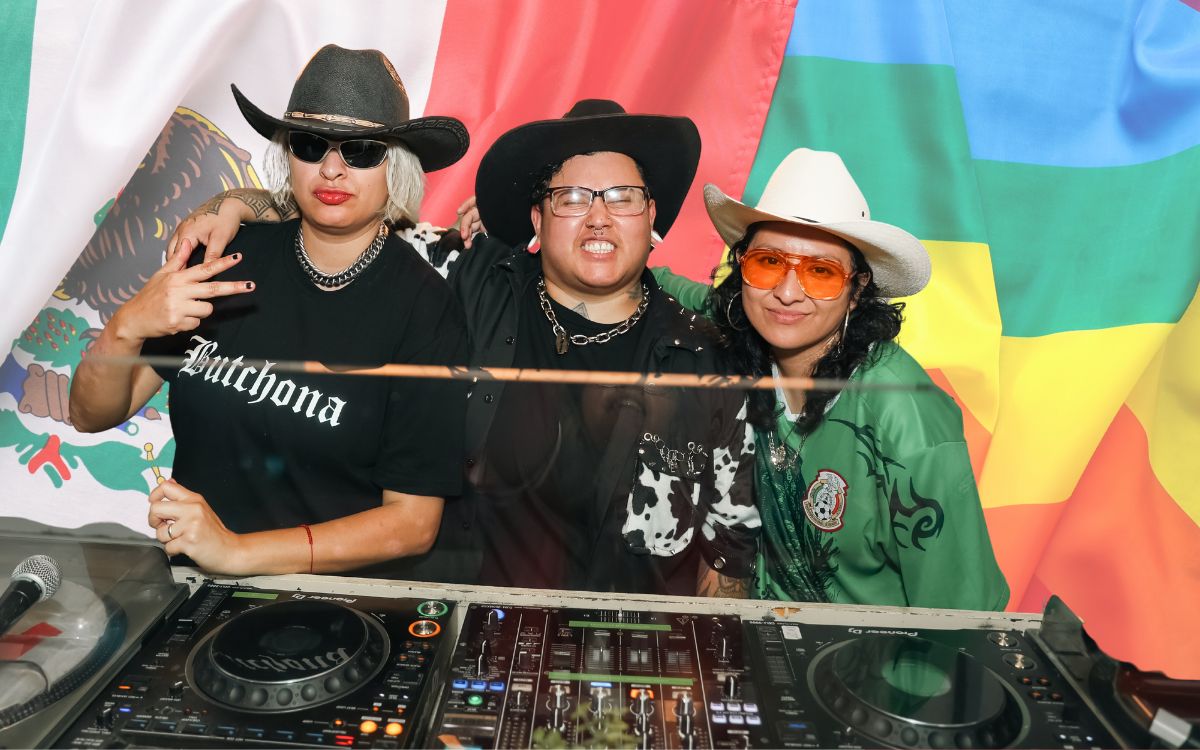
The rallying call urges all the Spanish-speaking and corrido-loving sapphics, butchonas, jotas and vaqueeras, to grab their boots and meet up at Little Joy Cocktails for a carne asada-style, family party every fourth Sunday of the month, featuring spins by DJ Lady Soul, DJ French and DJ Killed By Synth.
In Los Angeles, these three disc jockeys have embraced the word buchona, adding the ‘t’ as a play on the word butch.
The free event, now locally known as Butchona, is a safe space for all the Mexican and Spanish music-loving lesbians to gather on the last Sunday of every month.
Buchona is usually a term used in Mexico and other Spanish-speaking countries to describe a woman who is a boss– someone who exudes dominant energy or marries into a powerful position.
“I didn’t know how well [the idea for Butchona] was going to be received and my favorite part of all that, has been the looks everyone has been bringing,” said Rocio Flores, who goes by DJ Lady Soul.
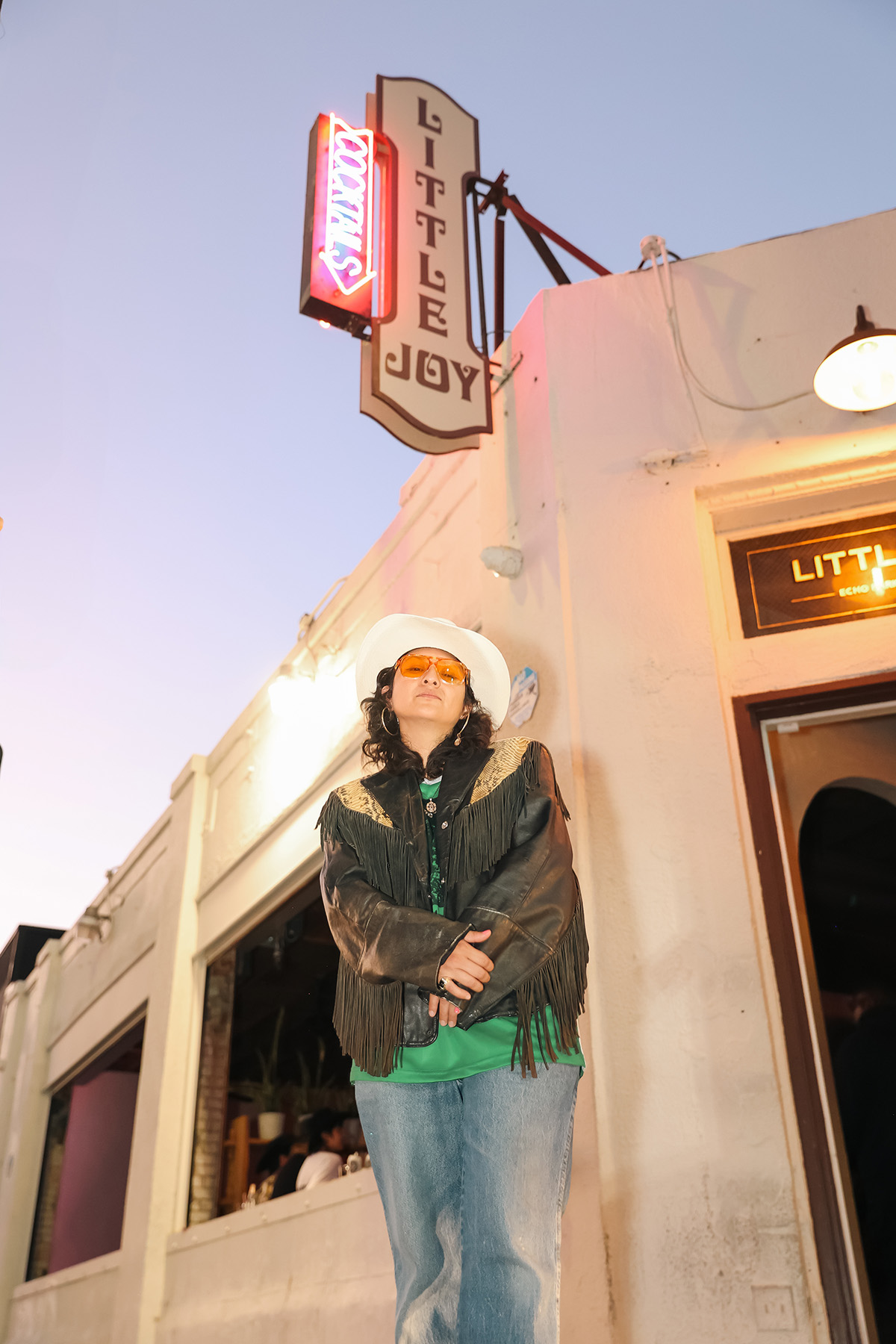
DJ Lady Soul poses outside of Little Joy Cocktails in her butchona outfit.
The event that started only a few months ago, brings in dozens of dressed-up jotas. The ‘looks’ that the crowds bring are reminiscent of how dad’s, tíos, and their friends dressed at Mexican family parties: a tejana, cowboy boots, giant belt buckle and a beer in hand.
Dressing up in these looks is a way to show wealth and status to earn the respect of other males in a male-dominated and -centered culture– that is until now.
This traditionally male, Mexican, cultural identity, is something that has never been embraced or accessible to women or gender non-conforming people. The giant belt buckles that are traditionally custom-made and specific to male identities like head of household, ‘only rooster in the chicken coop’ and lone wolf, are only part of the strictly cis-gendered male clothes that dominate the culture.
The embroidered button-ups, belt buckles and unique cowboy hats –all come together to create the masculine looks that are now being reclaimed by women and gender nonconforming people at the event curated by three queer, Mexican DJs, who once had a little idea that could.
Flores, 37, (she/her), Gemini, says that to her the term butchona describes a woman who is a little ‘chunti,’ a little cheap in the way she dresses– but in a queer way.
“That title also means that you’re a badass,” she said. “I want to look like that señor, I want to look like that dude and now I feel like I could, so why not?”
Flores says that now she feels like she can embrace and reclaim that cultural identity, but it wasn’t always that easy.
At first, her family upheld the traditional cisgender roles that forced her to dress more feminine, but she always wanted to dress like her cousins and her tíos.
“Now, I’m like: ‘Fuck that!’ I’m going to wear the chalecos and the Chalino suits,” she said in Span-glish.
The Chalino suits are traditional, Mexican, suits that were worn and popularized by Chalino Sanchez, known as the King of corridos—a genre of music that is said to have originated on the border region of Texas, Tamaulipas and Nuevo León, Mexico.
“It felt good to break into the DJ scene, but what I always noticed was that the lesbian culture was always lacking,” said DJ Lady Soul. “I would mainly see gay males at parties and a lot of male DJs.”
According to Zippia–a career site that sources their information from the U.S. Bureau of Labor and Statistics and the U.S. Census–23.5 percent of disc jockeys are women, 16 percent are LGBTQ+ and only 12.7 percent are Hispanic or Latin American.
What has always been a traditionally machista music genre and scene, is now being embraced by a growing number of queer women and non-male DJs in Los Angeles.
For Fran Fregoso, who goes by DJ French, 33, (they/she), Taurus– embracing their cultural identity came a lot easier because of their late uncle who sort of paved the way for them to come out as queer and be more accepted than he was as the first openly out queer person in their family.
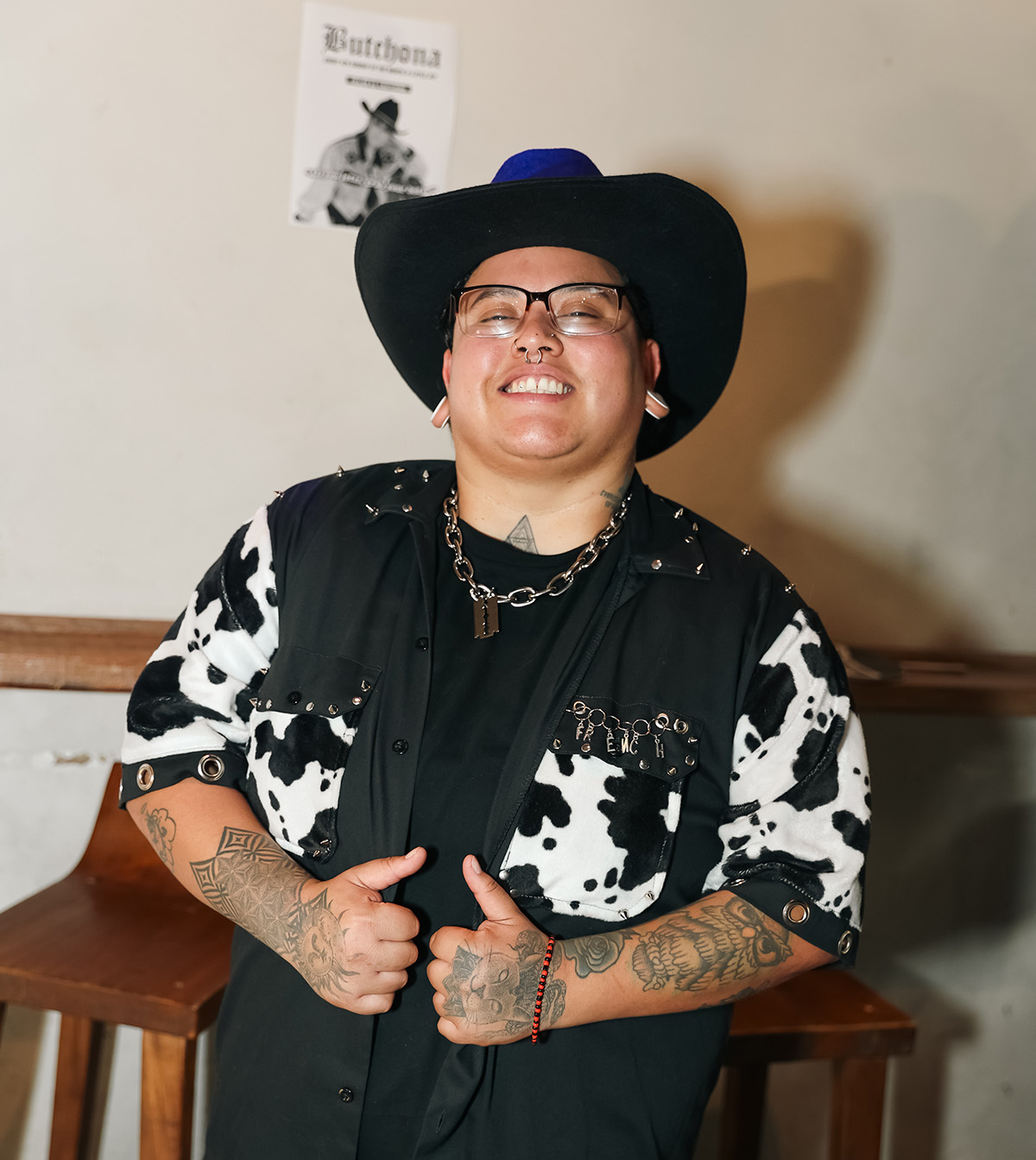
Their music journey began listening to the 90s grunge, alternative, hip-hop and metal music played by their older siblings at home.
“Then I met Vanessa [DJ Killed By Synth], and she introduced me to the industry,” said DJ French.
DJ French felt the acceptance and support to enter this music space and decided to embrace their cultural roots by playing music that they grew up listening to at family parties. They booked their first gig with Cumbiatón LA, a collective of DJs and organizers who host Latin American parties across Los Angeles, often centering queer DJs and other performers.
“When [Lady Soul and Killed By Synth], brought this idea up to create Butchona, I was like: ‘Oh, I’m in 100 percent’,” they said. “Because I love playing corridos and banda music because that’s a core memory from my childhood and family parties.”
Banda, corridos, cumbias and other traditional music is a big part of Mexican culture, even as gendered and male-centered as it has been, it is embraced by all.
“I know a lot of people in our queer, Latino, community love that music too, but they also want to be in a safe space,” they said. “That’s where we decided to make an environment for our community to dance and be themselves.”
Vanessa Bueno, 40, (she/her), Libra, who goes by DJ Killed By Synth, says her journey started about 20 years ago when she started DJing for backyard parties in East L.A. and across L.A. County.
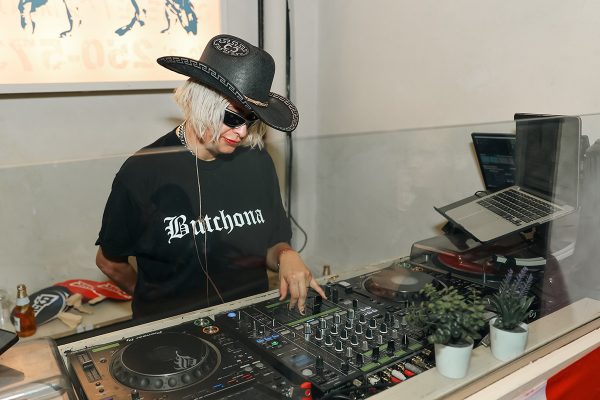
Her family is from Guadalajara, so she says that growing up she also had a lot of family parties with corridos and banda blaring in the background of memories with the many cousins she says she lost count of.
“A lot of the music we heard was bachata, banda, cumbia and even some 80s freestyle,” said Bueno.
Even while she had a ‘little punk rocker phase,’ she says she couldn’t escape that Spanish music her family played ritualistically at family get-togethers.
When they began their music journey–back in the AOL, Instant Messenger days, they played a lot more electronic music, hence the name Killed by Synth. At first, it was just a username, but then it became her DJ name.
“Later down the line, comes [the idea for] Butchona came about, and me, Rocio and French collaborated,” she said. “It’s kind of always been my goal to create these safe spaces for women and queer people, and I had been in the scene long enough to where people were willing to answer my calls to work with them to make it happen.”
For Bueno, it was natural for her to build community and embrace this part of their culture later on in her career when she saw a need for queer, Latin American-centered club spaces with family party vibes.
She started hosting Latin American-style parties, blending music, culture, and food and attracting the exact audience she envisioned. With these events, Bueno aimed to reclaim her Mexican identity and foster a sense of family and community at these events.
“We’re here to build a safe space to embrace the music and kind of not think about the machismo that is tied to it and celebrate who we are,” said Bueno.
According to the U.S. Department of Labor and Statistics, California, Texas, New York, Arizona and Washington rank the highest in employment rates for disc jockeys in 2023. There is also a recent trend in more women DJs–the study does not include gender nonconforming DJs–booking twice as many gigs as men in event spaces and concerts that host DJ sets.
“It feels like we’re barely cracking into these safe spaces and expanding our horizons a little bit,” said DJ French. “I hope this inspires other people to also create safe spaces like Butchona.”
The next Butchona event will be on Sunday, Oct. 27 and will feature all three DJs playing corridos, banda, cumbia and all the classics, for a chunti Halloween party.
Los Angeles
Urgent Prop 3 community town hall will feature discussion about marriage equality with local LGBTQ+ leaders
Join the conversation about safeguarding the freedom to marry for LGBTQ+ communities!
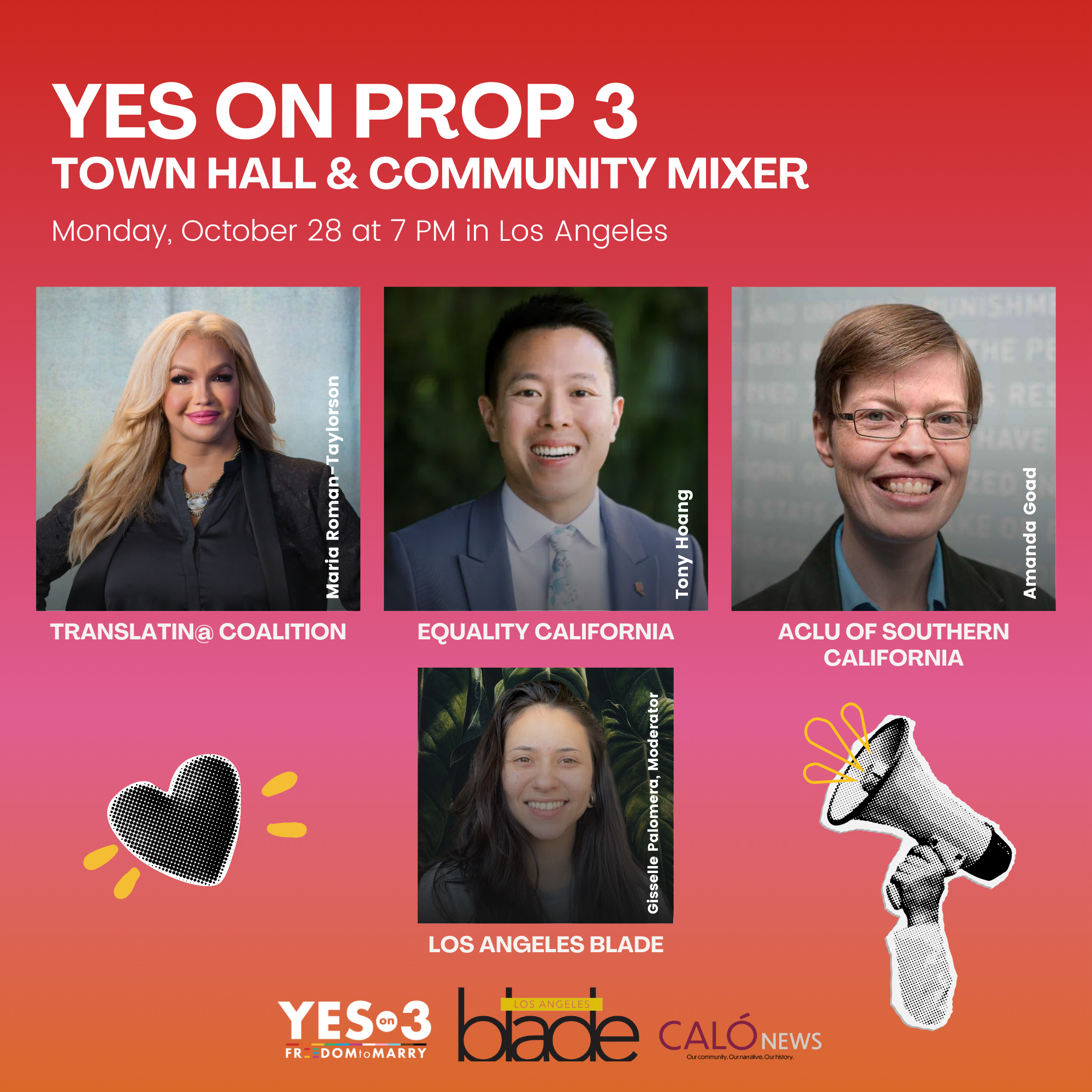
LGBTQ+ leaders will gather on Monday, Oct 28 at the historic St.Thomas the Apostle Church in Hollywood, for a community town hall and panel discussion in support of Proposition 3. The gathering will feature a panel with community leaders who will explain the importance of voting on this proposition, with a reception to follow the discussion.
The event is being hosted in collaboration with CALÓ News, a local nonprofit newsroom that covers Latinx issues across Los Angeles, and the Yes on Prop 3 campaign team. Los Angeles Blade will be using this opportunity to formally announce their new collaboration with CALÓ News with the addition of new Local News Editor, Gisselle Palomera.
The event begins at 7PM, starting with the town hall and panel discussion moderated by Palomera. Community leaders from the American Civil Liberties Union, Equality California, Trans Latin@ Coalition and the Gender and Reproductive Justice Project, will join Palomera on stage.
Proposition 3, also known as the Right to Marry and Repeal Proposition 8 Amendment and it aims to cement same-sex and interracial marriage equality in the California Costitution, which still only uses language that recognizes marriage can only be between a man and a woman.
To read more about Prop 3 ahead of the discussion, click here. To RSVP for the in-person community town hall event, click here.
California Politics
What you missed at the CD-14 debate between Ysabel Jurado and Kevin De León
LGBTQ+ candidate faces off against opponent Kevin De Leon on community forum on Wednesday
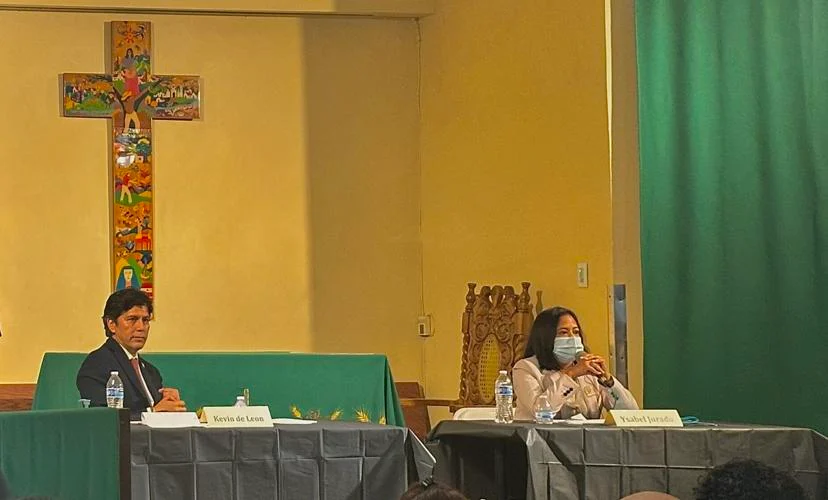
Los Angeles Council District 14 (CD-14) candidates Ysabel Jurado and Kevin de León sparred over their qualifications in what could have been their last in-person debate before the November election.
Wednesday’s CD-14 debate, a district home to approximately 265,000 people, 70% of them Latin American, offered the public a chance to hear from both candidates and their stand on issues such as homelessness, public safety and affordable housing, among other things.
CALÓ News was one of the media outlets that were present inside Dolores Mission Catholic Church in Boyle Heights, where the debate was held. Below are our reporter’s main takeaways.
People showed up and showed out. More than 300 people attended the debate, which was organized by Boyle Heights Beat and Proyecto Pastoral. More than 260 people gathered inside the church and the rest watched via a livestream projected on the church’s patio.
The debate was bilingual, with translation services available for all, honoring the many Spanish speakers that live in the district, as Brendan P. Busse, pastor of the church, said in the opening statement.
As part of the event guidelines, Busse also shared that no applause or booing was to be permitted, a rule that was broken within the first ten minutes of the forum. “Where you are tonight is a sacred place. People who are in need of shelter sleep here and have for the last 40 years,” he said when referring to the church transforming into a homeless shelter at night for over 30 adults. “Power and peace can live in the same place.”
That was the most peaceful and serene moment throughout the two-hour forum.
What followed was traded insults and competing visions from both candidates.
One of the first stabs occurred when De León accused Jurado of wanting to “abolish the police” and when Jurado reminded the public of De Leon’s “racist rhetoric,” referring to the 2022 scandal over the secretly recorded conversation with Gil Cedillo and Nury Martínez where they talked about indigenous Mexicans, Oaxacans, the Black and LGBTQ+ communities and councilman Mike Bonin’s adopted son.
“I made a mistake, and I took responsibility. I have been apologizing for two years,” De León said. “Just as in the traditions of the Jesuits, love, reconciliation [and] peace, one must choose if we are going to be clinging to the past or move forward. I choose to move forward.”
When Jurado was asked about her stance on police, she said she had never said she wanted to abolish the police. “Don’t put words in my mouth,” she told De León. “I have never said that,” she said. “We put so much money into public safety into the LAPD yet street business owners and residents in these communities do not feel safer. The safest cities invest in communities, in recreation and parks, in libraries [and] youth development.”
De León and Jurado also discussed their plan to work with the homeless population, specifically during the 2028 Olympic and Paralympic Games in Los Angeles. In Los Angeles County, an estimated 75,312 people were experiencing homelessness, as stated in the 2024 homeless count. For CD-14 the issue of homelessness takes a higher level as it is home to Skid Row, which has one of the largest homeless populations in the U.S.
“We should continue to house our unhoused,” De León said.
He followed this by saying that under his leadership, CD-14 has built the most interim housing than “in any other place in the entire city of L.A.” He made a reference to the Boyle Heights Tiny Home Village and 1904 Bailey, both housing projects in CD-14.
“We need safety when the Olympics come,” he added.
Jurado said De León’s leadership has fallen short in his years in office, specifically when it comes to the homeless population and said that housing like the tiny homes is not sufficient for people in the district to live comfortably.
“My opponent has governed this district, Skid Row, for over 20 years. Has homelessness in this district gotten better? We can all agree that it hasn’t,” she said. “County Supervisor Hilda Solís put up 200 units that are not just sheds; they have bathrooms, they have places and they have support services. Why hasn’t [CD-14] gotten something better than these tiny homes?”
One of De León’s repeating arguments in various of his answers was the fact that Jurado has never held public office before. “I’ve dedicated my whole life to public service, to the benefit of our people. My opponent, to this day, has not done one single thing,” De León said in the first few minutes of the debate.
In one of the questions about low-income elders in the district, he listed some of his achievements when helping this population, including bringing free vaccines for pets of seniors of this district and food distributions, which, as De León noted, help people with basic food needs, including beans, rice and chicken. “The same chicken sold in Whole Foods,” he said.
Jurado defended herself against the reality of never holding public office and said her work as a housing rights attorney and affordable housing activist have given her the tools and experience to lead the district in a different direction than the incumbent, De León. “We can’t keep doing the same thing and expect different results,” Jurado said. ‘We need long-term solutions,” she said.
Last month, The L.A. Times also reported on Jurado’s past political experience, including working on John Choi’s unsuccessful 2013 run for City Council, as well as her work as a scheduler in Mayor Eric Garcetti’s office and how she was appointed by Garcetti to the Human Relations Commission in 2021.
She later added that she was proud to already have the support of some of the L.A. City Council members, such as Eunisses Hernández, Nithya Raman and Hugo Soto-Martínez, which De León later referred to as the “socialist council members.”
After the debate, CALÓ News talked to both candidates and asked how they thought the debate went.
“It was a spirited debate, no question about it,” De León said. “Sometimes elections can take a real ugly twist that is very similar to Trump-ian characteristics. Like Donald Trump just says whatever he wants to say, no matter how outlandish [or] inaccurate it is.”
When asked the same question, Jurado said, “ I think my opponent said a bunch of lies and said that he has plans for this district when he’s had four years to execute all of them. It’s really disappointing that only now he suddenly has all these ideas and plans for this district.”
Both candidates told CALÓ News they will continue working until election day and making sure CD-14 residents show up to vote.
“But I think past the debate[s], it’s just [about] keeping your nose to [the] grindstone, working hard, and taking nothing for granted, knocking on those doors and talking directly to voters,” De León said.
Jurado said she still has a couple other events that she and her team are hosting before election day. “I’m out here talking to voters. We want to make sure that people know who I am and that they have other options. People are disappointed. We’re going to keep folks engaged and make sure that [they] turn out to the polls,” she said.
Jorge Ramírez, 63, from Lincoln Heights, said he has been supporting De León since his time in the State Senate and said he will continue to vote for him because he doesn’t know much about his opponent. “He is the type of person we need. He’s done a lot for immigrants,” he said. “The other person, we don’t know much about her and she’s not very well known. She doesn’t have much experience in this field.”
Alejandra Sánchez, whose daughter goes to school in Boyle Heights and lives in El Sereno, said she believes CD-14 has been in desperate need of new leadership and worries that many people will vote for De Leon just because he is who they have known for so long. “It’s very powerful to see a woman leader step in… It’s been an incredible year to see a woman president elected in Mexico, a woman running for president in the U.S. and a woman also running for leadership here in our community,’ she said. “That’s part of the problem… we are afraid to think about something new, about the new leadership of someone doing things differently.”
General election day will take place on Tuesday, November 5, 2024. Early voting began on October 7. You can register to vote or check your registration status online on the California Online Voter Registration page.
AIDS and HIV
40th anniversary AIDS Walk happening this weekend in West Hollywood
AIDS Project Los Angeles Health will gather in West Hollywood Park to kick off 40th anniversary celebration
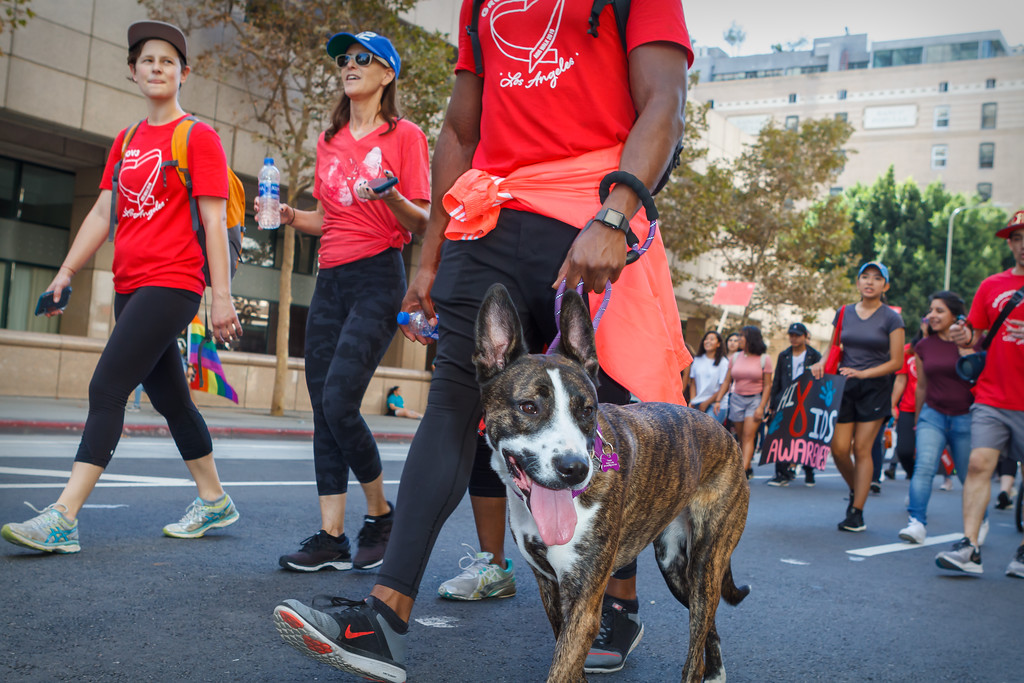
APLA Health will celebrate its 40th anniversary this Sunday at West Hollywood Park, by kicking off the world’s first and oldest AIDS walk with a special appearance by Salina Estitties, live entertainment, and speeches.
APLA Health, which was formerly known as AIDS Project Los Angeles, serves the underserved LGBTQ+ communities of Los Angeles by providing them with resources.
“We are steadfast in our efforts to end the HIV epidemic in our lifetime. Through the use of tools like PrEP and PEP, the science of ‘undetectable equals intransmissible,’ and our working to ensure broad access to LGTBQ+ empowering healthcare, we can make a real step forward in the fight to end this disease,” said APLA Health’s chief executive officer, Craig E. Thompson.
For 40 years, APLA Health has spearheaded programs, facilitated healthcare check-ups and provided other essential services to nearly 20,000 members of the LGBTQ+ community annually in Los Angeles, regardless of their ability to pay.
APLA Health provides LGBTQ+ primary care, dental care, behavioral healthcare, HIV specialty care, and other support services for housing and nutritional needs.
The AIDS Walk will begin at 10AM and registrations are open for teams and solo walkers. More information can be found on the APLA Health’s website.
-
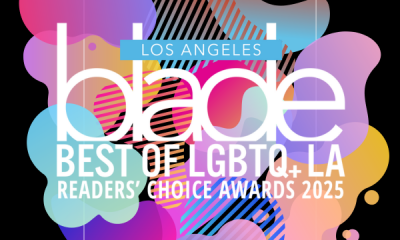
 Arts & Entertainment22 hours ago
Arts & Entertainment22 hours ago2025 Best of LGBTQ LA Readers’ Choice Award Nominations
-
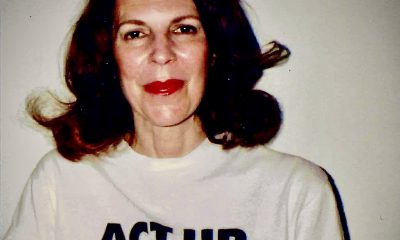
 Obituary4 days ago
Obituary4 days agoNanette Kazaoka, an unlikely AIDS activist, dies at 83
-

 Local1 day ago
Local1 day ago‘Think of those who have not been seen,’ Cynthia Erivo’s powerful message at GLAAD Awards
-

 Features24 hours ago
Features24 hours agoTristan Schukraft speaks on keeping queer spaces thriving
-
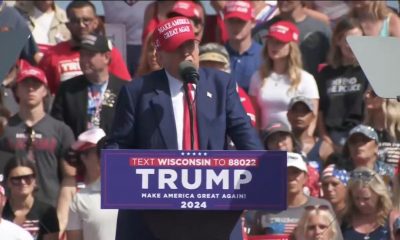
 Opinions23 hours ago
Opinions23 hours agoGay bar in California bans MAGA gear — but no other political expression — from its premises
-
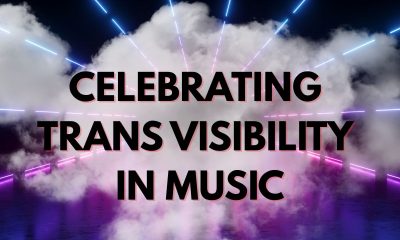
 Arts & Entertainment16 hours ago
Arts & Entertainment16 hours agoTrans Day of Visibility: Let us put you on 5 Latinx musicians you should be listening to right now

